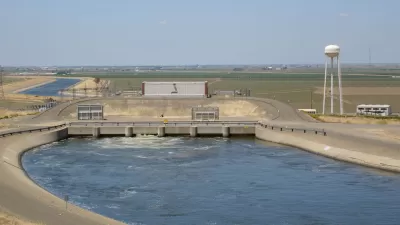On the heels of losing an oil reduction mandate due to lobbying by Big Oil, another key climate bill failed to pass—setting greenhouse gas reduction targets beyond 2020. An oil pipeline safety bill resulting from Santa Barbara spill passed.
As posted here in March, SB 32, which goes by the same name as the landmark AB 32, "The California Global Warming Solutions Act of 2006," would have required greenhouse gases to be cut to 80 percent below the 1990 levels by 2050.
The bill by Sen. Fran Pavley, D-Agoura Hills, who also was an author of AB 32 in 2006, "failed to win enough support from lawmakers and faced objections from the governor's office," write Patrick McGreevy and Melanie Mason for the Los Angeles Times. She "vowed to revive it next year."
The regular 2015 legislative season ended on Friday, September 11, although an interim session continues where they will take up transportation funding. "The defeat came a day after Gov. Jerry Brown and legislative leaders withdrew a key portion of another proposal to combat climate change [SB 350], one calling for California to cut its use of gasoline in half," write McGreevy and Mason.
Pavley tried to overcome opposition to her measure by changing it to provide more legislative oversight of the state's powerful Air Resources Board, which has become a sticking point in climate-related negotiations with lawmakers.
However, the amendments she added were opposed by Brown, who indicated that they "could have weakened the state's existing ability to fight climate change," said Gareth Lacy, the governor's deputy press secretary. "We can't trade what is already being done to reduce greenhouse gas emissions to get a new bill."
In other action, "legislators voted for (annual) inspections of thousands of miles of oil pipelines crisscrossing the state, a response to the massive crude oil spill in May that fouled the Santa Barbara County coastline and dumped 20,000 gallons of crude into the Pacific Ocean," write McGreevy and Mason on the passage of SB 295, authored by Sen. Hannah-Beth Jackson (D-Santa Barbara).
The total spill from the 11-mile-long underground pipe owned by Houston-based Plains All American Pipeline was 101,000 gallons. We initially reported it was 21,000 gallons. "It was being inspected every other year," notes The Times. "Federal regulators later discovered that corrosion had eaten away half of the pipeline's metal wall."
The pipeline also was "the only large transmission line in Santa Barbara County not fitted with an automatic shutdown valve, according to federal officials," write McCreevy and Mason. "AB-864: Oil spill response: environmentally and ecologically sensitive areas," would require the shutoff valves.
While it did not pass, it "goes back to the Assembly, where it originated, for action on amendment," to be heard in January 2016 unless it is considered in the interim session. Gov. Brown has until October 11 to sign or veto bills that passed, including SB 295 and SB 350, without the oil reduction mandate, or they become law without his signature.
Hat Tip: Darrell Clark, Beyond Oil Advocate.
FULL STORY: California lawmaker withdraws bill to curb carbon emissions

Planetizen Federal Action Tracker
A weekly monitor of how Trump’s orders and actions are impacting planners and planning in America.

San Francisco's School District Spent $105M To Build Affordable Housing for Teachers — And That's Just the Beginning
SFUSD joins a growing list of school districts using their land holdings to address housing affordability challenges faced by their own employees.

The Tiny, Adorable $7,000 Car Turning Japan Onto EVs
The single seat Mibot charges from a regular plug as quickly as an iPad, and is about half the price of an average EV.

Seattle's Plan for Adopting Driverless Cars
Equity, safety, accessibility and affordability are front of mind as the city prepares for robotaxis and other autonomous vehicles.

As Trump Phases Out FEMA, Is It Time to Flee the Floodplains?
With less federal funding available for disaster relief efforts, the need to relocate at-risk communities is more urgent than ever.

With Protected Lanes, 460% More People Commute by Bike
For those needing more ammo, more data proving what we already knew is here.
Urban Design for Planners 1: Software Tools
This six-course series explores essential urban design concepts using open source software and equips planners with the tools they need to participate fully in the urban design process.
Planning for Universal Design
Learn the tools for implementing Universal Design in planning regulations.
Smith Gee Studio
City of Charlotte
City of Camden Redevelopment Agency
City of Astoria
Transportation Research & Education Center (TREC) at Portland State University
US High Speed Rail Association
City of Camden Redevelopment Agency
Municipality of Princeton (NJ)




























